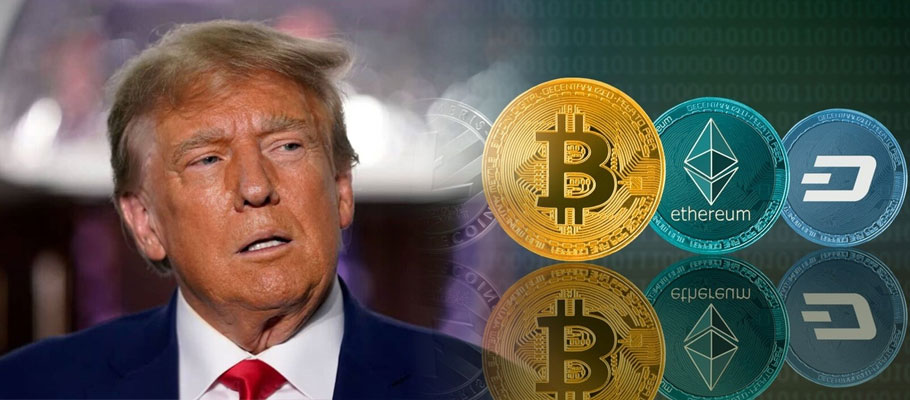
Published: March 13th, 2024
Speaking to journalists this week, former (and possible future) US president Donald Trump gave cryptocurrencies a surprise thumbs-up, noting that his recent crypto dabblings had been highly profitable and suggesting that he would support wider adoption if re-elected this coming November.
‘A lot of people have been using crypto successfully, and I don't think it makes sense to take that away from them at this stage,’ Trump told the hosts of CNBC's morning Squawk Box broadcast for investors.
When asked about Bitcoin's recent price surge, the former president said his personal experience with cryptocurrencies had ‘made lots of money,’ particularly the use of NFTs to create licensed products such as Trump-themed trading cards. The limited-edition cards could be purchased using several cryptocurrencies.
‘I can make money with crypto and, you know, it's fun,’ Trump said. ‘It's a crazy new kind of money, but whether it's Bitcoin or others, people are using them more and more.’
At time of writing, Trump held around USD 8.6 million in crypto derived from sales of his NFT trading cards and campaign donations received in various coins. The bulk of his crypto holdings are now denominated in MAGA, the Trump-themed meme coin created for him in Autumn 2023.
In December 2023, Trump withdrew USD 2.3 million in ETH from one wallet. The former reality TV host admitted that positive experiences with crypto changed his mind about an asset class he was previously skeptical about. He did say, however, that no one should give up on the US Dollar.,
‘To me it's really just an additional form of currency, another option,’ Trump said. ‘I've always said that I preferred a strong US currency, and I don't want people abandoning the dollar. I still believe that, but there's no denying that crypto has taken on a life of its own.’
Trump's about-face on crypto follows another populist politician's embrace of digital money. Libertarian contender and Bitcoin advocate Javier Milei took office as President of Argentina this year after winning a second-round runoff in November 2023.
Data from Reuters showed that Milei took 56.3 per cent of the vote versus 44.2 per cent for center-left rival Sergio Massa, Argentina's former economy minister.
Calling his mandate the ‘rebuilding Argentina,’ Milei told supporters that the challenges of a spiraling inflation rate and a rapidly declining peso meant that ‘there is no longer time for gradual measures.’ He vows to implement a program of economic shock therapy that includes eliminating Argentina’s central bank, effectively abandoning the peso and letting the economy move to dollarization.
Milei was and remains an enthusiastic Bitcoin supporter, calling the cryptocurrency a return to the original creator of money, the private sector. He opposes the existence of central banks on principle and has described Argentina's central bank as ‘one of the great confidence schemes in our nation's history.’ He claims that central bankers rob normal citizens of spending power through inflation, which operates as a stealth tax. Bitcoin, he has said, is a natural reaction against central bank scheming.
Known for his shock of unkempt hair and hardline libertarian policy prescriptions, 53-year-old Milei first gained notoriety as an economist and harsh government critic before being elected to Argentina's congress in 2021.
During the Presidential campaign, Milei struck an extreme populist pose, often waving a chainsaw at political events to demonstrate his commitment to cutting government spending. Among his more radical proposals are to allow a free market in both firearms and human organs.
Argentina was already a Bitcoin early-adopter nation before Millei's arrival. In August 2022 the country's West-central Mendoza province began accepting stablecoins as payment for tax bills.
The province, which borders Chile on the west, expanded the payment options for its 1.7 million citizens in an effort to make tax payments easier and more convenient, according to a press release on the government website.
In a lengthy document explaining the process for crypto payment, the state tax authority listed MakerDAO's DAI and Tether's USDT stablecoins as available options.
Taxpayers can use crypto wallets from Ripio, Lemon, Buenbit, Binance, Bitso, or Bybit amongst others. After providing ID and other preliminary information, a tool on the tax authority's website generates a QR code users can scan with their crypto wallets.
After receiving the stablecoins, the provincial government converts the US-dollar-pegged cryptos to Argentine pesos (ARS) and generates a receipt for the transaction.
Mendoza province is situated in western-central Argentina. The capital city is also called Mendoza. It's Argentina's fourth largest province by population, with over 1.7 million inhabitants.
Argentina, which has frequently seen its economy and politics roiled by political upheaval, extreme inflation, and major bankruptcies, had been cozying-up to crypto in the early part of the year. It posted a 63 per cent year-over-year inflation rate in August 2022, perhaps explaining some of the Mendoza government's enthusiasm for giving taxpayers more flexibility and choice. Cryptocurrencies had been touted by some in the country as a hedge against inflation.
With stablecoins tied to the mighty greenback, America's relatively lower 8.5 per cent inflation rate offers a way for some Argentines to protect their household spending power.
A surge in Argentinian forex traders using crypto to swap ARS for USD had previously prompted the federal government in Buenos Aires to impose restrictions on the activity.
Back in August 2021, Argentine president Alberto Fernandez said that he was open to the idea of crypto playing a larger role in the South American country's economy.
In an interview with Reuters, Fernandez said he would consider the creation of a central bank digital currency, or possibly follow northern Neighbour El Salvador's lead and make Bitcoin one of the country's forms of legal lender.